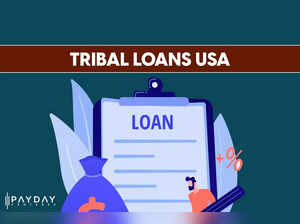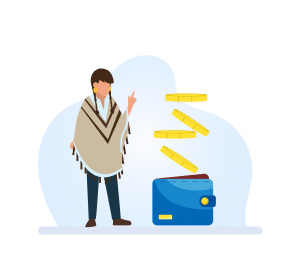Are Tribal Loans Legal? Unpacking the Confusing World of Online Lending
Are Tribal Loans Legal? Unpacking the Confusing World of Online Lending

The internet is awash with promises of quick cash. From payday loans to installment loans, the online lending landscape seems to offer a solution for every financial emergency. But one type of loan, often advertised as a quick and easy fix, has sparked controversy and confusion: tribal loans.
These loans, often offered by lenders claiming affiliation with Native American tribes, have come under fire for their high-interest rates and questionable legality. But what exactly are tribal loans, and are they truly legal?
Related Articles: Are Tribal Loans Legal? Unpacking the Confusing World of Online Lending
- Guaranteed Loans For Bad Credit? Don’t Get Your Hopes Up!
- Cash-Strapped? Tribal Loans Might Be Your Lifeline (But Read This First!)
- The Rise Of The New Tribal Lenders: Friend Or Foe?
- Guaranteed Loan Approval? Don’t Get Scammed!
- Stuck In A Credit Crunch? Tribal Loans Might Be Your Lifeline (But Read This First!)
Understanding the Tribal Loan Landscape
Tribal loans are essentially payday loans or installment loans offered by lenders who claim to be based on Native American reservations. These lenders argue that their operations are governed by tribal law, which allows them to bypass state usury laws that cap interest rates.
The Argument for Tribal Loan Legality:
Proponents of tribal loans argue that they provide a valuable service to individuals who may not qualify for traditional loans. They claim that tribal law, which is sovereign and separate from state law, allows them to set higher interest rates. They also point out that tribal sovereignty is recognized by the federal government, giving them the right to operate independently within their territories.
The Argument Against Tribal Loan Legality:
Critics of tribal loans, including consumer advocacy groups and state attorneys general, argue that these loans are predatory and exploit vulnerable borrowers. They claim that the high interest rates, which can often exceed 400%, are usurious and trap borrowers in a cycle of debt. They also argue that the tribal sovereignty argument is a legal loophole that allows lenders to avoid state regulations and consumer protections.
The Legal Gray Area:
The legality of tribal loans is a complex issue with no clear-cut answer. Here’s why:

- Conflicting Laws: State usury laws aim to protect borrowers from exploitative lending practices, while tribal sovereignty grants Native American tribes the right to govern their own affairs, including financial matters. This creates a legal conflict, leaving the question of tribal loan legality in a gray area.
- Jurisdictional Disputes: It’s unclear whether state or tribal law takes precedence in loan agreements. Courts have often struggled to determine the proper jurisdiction in tribal loan cases.
- Lack of Transparency: Many tribal loan lenders operate online, making it difficult for borrowers to determine the actual location of the lender and the applicable laws.

The Rise of Regulatory Scrutiny:
In recent years, federal and state regulators have begun to scrutinize tribal loan practices.
- The Consumer Financial Protection Bureau (CFPB) has investigated several tribal lenders, accusing them of engaging in deceptive and unfair lending practices.
- State attorneys general have filed lawsuits against tribal lenders, alleging violations of state usury laws and consumer protection laws.
- The Federal Trade Commission (FTC) has also taken action against tribal lenders, claiming that they have engaged in deceptive marketing practices.

The Impact on Borrowers:
The legal uncertainty surrounding tribal loans creates a risky situation for borrowers.
- High Interest Rates: The exorbitant interest rates charged by tribal lenders can quickly spiral borrowers into debt, making it difficult to repay the loan.
- Lack of Transparency: The lack of clear information about the lender’s location and applicable laws can make it difficult for borrowers to understand the terms of the loan and their rights.
- Potential Legal Action: Borrowers may face legal action from tribal lenders if they default on their loans, even if they believe the loan was illegal or predatory.
What to Do If You’re Considering a Tribal Loan:
Given the legal uncertainties and potential risks associated with tribal loans, it’s best to avoid them altogether. Here’s what you should do instead:
- Explore Alternative Options: Consider other options for borrowing money, such as personal loans from banks or credit unions, which typically offer lower interest rates and more transparent terms.
- Seek Financial Counseling: If you’re facing a financial emergency, contact a reputable credit counseling agency for advice and support.
- Understand Your Rights: Educate yourself about your rights as a borrower and the laws that protect you from predatory lending practices.
Conclusion:
The legality of tribal loans remains a complex and contentious issue. While tribal sovereignty is a valid legal principle, it should not be used to exploit borrowers with high-interest rates and opaque lending practices. It’s essential to understand the risks involved before considering a tribal loan and to explore alternative borrowing options that are more transparent and fair.
FAQ: Are Tribal Loans Legal?
Q: What are tribal loans?
A: Tribal loans are payday loans or installment loans offered by lenders who claim to be based on Native American reservations. They argue that tribal law allows them to bypass state usury laws.
Q: Are tribal loans legal?
A: The legality of tribal loans is a complex issue with no clear-cut answer. State usury laws conflict with tribal sovereignty, creating a legal gray area.
Q: What are the risks of taking out a tribal loan?
A: The risks include high interest rates, lack of transparency, and potential legal action from lenders.
Q: What should I do if I’m considering a tribal loan?
A: It’s best to avoid tribal loans altogether and explore alternative borrowing options, such as personal loans from banks or credit unions.
Q: What are the arguments for and against tribal loan legality?
A: Proponents argue that tribal loans provide a service to those who don’t qualify for traditional loans. Critics argue they are predatory and exploit borrowers.
Q: Are there any regulations governing tribal loans?
A: The CFPB, state attorneys general, and the FTC have investigated and taken action against tribal lenders for deceptive practices.
Q: What are my rights as a borrower if I take out a tribal loan?
A: It’s essential to understand your rights as a borrower and the laws that protect you from predatory lending practices. Consult with a credit counseling agency or legal professional.
Remember, when it comes to borrowing money, knowledge is power. Do your research, understand the risks, and choose a loan option that is right for you.

Closure
Thus, we hope this article has provided valuable insights into Are Tribal Loans Legal? Unpacking the Confusing World of Online Lending. We thank you for taking the time to read this article. See you in our next article!


